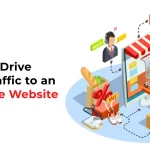
How Much Does An eCommerce Website Cost In California, USA?
With the advent of eCommerce, business operations have been completely transformed. Hence, all companies need to have an appealing online presence. If you are a small business that has just opened its doors for the first time or even a well-established firm that seeks to grow its online operations. Having a functional eCommerce website can be the tipping point. Nevertheless, one of the most popular inquiries among Californian businesses is, ‘How much does it cost to build eCommerce website in California? The question is complicated since many factors come into play, such as the level of sophistication of the site, the desired functionalities, and the qualifications of the web developers.
In this blog, we will explore the eCommerce website cost in California, including costs for B2B website development and the different factors that influence the overall price.
What Is An eCommerce Website?
Prior to exploring the particulars related to eCommerce website development cost in California, it is important to clarify what an eCommerce website is and why every business needs one. An eCommerce website is one that allows the selling of goods or services over the Internet. It takes orders and payments through its pages. Such websites vary, from a few pages offering a few items to large sites that conduct thousands of transactions a day.
For California-based businesses, a dependable eCommerce site is imperative to reach out to more people and take advantage of California’s incredible market. Whether you are selling to final customers or other businesses (B2B), an appealing site can boost sales, provide better service to customers, and improve the brand’s image.
What Factors Influence The eCommerce Website Development Cost In California?
Multiple factors dictate the development of eCommerce website cost in California. Such factors include the extent of the project, the design, and functionality demands as well as the degree of customization that is required. Given this, below are the main features that determine the total cost:
1- Website Design And User Experience (UX)
The layout of an eCommerce site is fundamental to its usefulness, customer retention, and, ultimately, sales. An attractive and user-friendly site improves the overall user experience, which translates to a high conversion rate. The eCommerce website development cost in California particularly goes up with custom designs as opposed to the cheaper option of using ready-made designs.
- Basic Design: If you’re on a budget, using templates or pre-built themes can keep costs lower. However, this might limit customization options.
- Custom Design: For businesses looking to differentiate themselves with a unique brand identity, custom design is the way to go. This will significantly increase the cost but provide greater flexibility and control over the website’s look and feel.
2- Platform Selection
The platform you select for designing your eCommerce website is one of the most crucial considerations that will determine the overall cost. Some of the common platforms include Shopify, WooCommerce, Magento, and BigCommerce, and each has its own pricing scheme.
- Shopify and BigCommerce: These are hosted platforms that offer subscription-based pricing. They are easier to set up and use but may require additional costs for apps and plugins.
- WooCommerce: Built on WordPress, WooCommerce is free, but you’ll need to pay for hosting, design, and development.
- Magento: Best for large-scale businesses, Magento offers more features and scalability but also comes with higher development costs.
3- Functionality And Features
The presence of additional features in your website directly affects the cost implications of the website. The basic eCommerce website consists of basic functionalities like product pages, shopping carts, and payment. Nonetheless, eCommerce website cost in California will be higher for businesses that need advanced multiple payment methods, stock management, B2B features, and even live shipping information.
- Basic Features: These include a simple product catalog, user registration, shopping cart, and payment processing.
- Advanced Features: Businesses often need more complex features, such as integration with external systems (CRM, ERP), customizable product pages, user behavior analytics, and multi-language support, all of which increase the price.
4- Customization And Integration
Off-the-shelf solutions can be limiting when it comes to growing and scaling your business. If you require highly customized functionalities, such as unique checkout processes or specific B2B requirements, the b2b website development cost in California will be higher.
Additionally, integrating your eCommerce platform with other systems—such as inventory management software, accounting tools, or customer relationship management (CRM) platforms—adds to the complexity and cost of development.
5- Mobile Optimization
The first ranking factor of any eCommerce site these days is mobile responsiveness. In an era where every other person owns a smartphone, a non-mobile-optimized site can turn down willing buyers. Mobile optimization is the ability of the website to have a reactionary framework and go beyond that particular room. This trait might increase the cost to build eCommerce website in California, but it is very important for achieving the objectives.
6- Security Features
As threats to cybersecurity continue to escalate with time, it becomes increasingly important to protect your eCommerce site as it deals with sensitive information like the credit card numbers of customers. Adding features like SSL certificates, PCI compliance, and data encryption may increase the eCommerce website cost in California but they are vitally important in shielding your business and customers from the security threats.
7- SEO And Marketing Features
The importance of search engine optimization (SEO) cannot be overstated as far as generating traffic for your eCommerce site is concerned. Implementing SEO-friendly elements like optimized URLs, meta tags, and schema markup can enhance the ranking of a website in search engine results pages. In addition, you might also consider purchasing additional marketing tools such as email marketing integration, social media integration, and content management system (CMS) to help improve the engagement and conversion rate.
8- Ongoing Maintenance And Support
Another consideration that should not be ignored is the cost involved in the upkeep of an eCommerce website. Updating content, fixing bugs, and applying security patches are essential for ensuring that the website performs optimally. Most app development companies or individual developers also provide frequent maintenance work for a monthly or yearly fee.
Also Read: Top 10 eCommerce Development Companies In California In 2024
What Will Be The Estimate Cost To Build eCommerce Website In California?
After talking about the variables that influence price, let’s have a look at some ballpark figures for the eCommerce website development cost in California:
- Basic eCommerce Website: For a small business looking for a basic eCommerce website with essential features, the cost typically ranges between $1,000 to $3,000. This includes standard design, a simple product catalog, and basic functionality.
- Mid-Level eCommerce Website: Expect to pay between $2,000 and $7,000 for a more robust website with a custom design, enhanced features like multiple payment gateways, and advanced marketing tools.
- Enterprise-Level eCommerce Website: Depending on the complexity and features needed, the b2b website development cost in California can range from $10,000 to more for large-scale organizations or B2B platforms that require sophisticated customization, integration with CRM or ERP systems, and high-level security.
Wrapping Up!
The eCommerce website cost in California is mostly determined by the type of business, features that are needed, and size of operations. Overall, your eCommerce website will be able to deliver long-term, sustainably high levels of performance and an excellent user experience if you have the right development firm working with you. This will set your company up for success in the California market.







